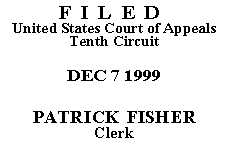

| CHIBU ANAEME,
Plaintiff-Appellant, v. LOVELACE HEALTH SYSTEMS, INC., a New Mexico corporation; PAM CASTILLO, individually and in her official capacity as Lovelace Senior Human Resources Consultant; J. D. LARSON, individually and in his official capacity as Lovelace Pharmacy Director; CAROL SHELTON, individually and in her official capacity as Lovelace Director of Human Resources; TOM MURVIN, individually and in his official capacity as Lovelace Association Director of Outpatient Pharmacy Services; KATHY SWANSON, individually and in her official capacity as Lovelace Pharmacy Team Leader and MARIA REYES, individually and in her official capacity as Lovelace Human Resources Director, Defendants-Appellees. |
|
Plaintiff Chibu Anaeme appeals the district court's dismissal of his employment/race discrimination case on summary judgment. We exercise jurisdiction pursuant to 28 U.S.C. § 1291 and affirm.
Plaintiff initiated this action against Lovelace Health Systems, Inc. and some of its employees, invoking Title VII, 42 U.S.C. § 1981, the New Mexico Human Rights Act, and common law (he claims infliction of emotional distress). Plaintiff, a pharmacist of Nigerian origin, alleges that, although he attempted to secure employment with Lovelace multiple times between January and April of 1995, Lovelace failed to interview and/or to hire him based on his race, color, or national origin. He challenges nine of Lovelace's hiring decisions during this period. In addition, plaintiff alleges he "suffered extreme psychological harm" because of defendants' discriminatory, extreme, outrageous, and intentional conduct. R., Vol. I, Doc 1 at 9.
The district court granted defendants' motion for summary judgment and entered judgment against plaintiff, dismissing his case. The district court found that, with respect to his discrimination claims, plaintiff failed to make a prima facie case in seven of the nine purported instances of discrimination as he failed to come forth with evidence showing he timely applied for these positions. For the remaining two positions, the district court assumed plaintiff had met his prima facie case, but ruled he did not rebut Lovelace's articulated and legitimate, nondiscriminatory reasons for its conduct.(1) As to his common law claim for intentional infliction of emotional distress, the district court found that, since plaintiff "failed to demonstrate that Defendant's conduct was anything but legitimate business practice," his claim of extreme and outrageous conduct could not withstand summary judgment. Id., Doc. 65 at 14.
Plaintiff challenges the district court's grant of summary judgment, contending that: (1) it erred by holding he failed to establish a prima facie case in seven of the nine hiring decisions at issue; (2) it erred by holding he did not establish a prima facie case in one of the nine hiring decisions because, although his application was timely, it took Lovelace ten days to forward it to the hiring officer; and (3) there are outstanding genuine issues of material fact regarding Lovelace's articulated reasons for its conduct.
We review de novo the district court's decision granting summary judgment and apply the same legal standards as the district court. See Bullington v. United Air Lines, Inc., 186 F.3d 1301, 1313 (10th Cir. 1999). Summary judgment is appropriate on a record demonstrating that "there is no genuine issue as to any material fact and that the moving party is entitled to a judgment as a matter of law." Fed. R. Civ. P. 56(c). As always, "we view the factual record and inferences therefrom in the light most favorable to the nonmoving party." Bullington, 186 F.3d at 1313.
Once the moving party meets its "initial burden to show that there is an absence of evidence to support the nonmoving party's case," Thomas v. IBM, 48 F.3d 478, 484 (10th Cir. 1995) (quotation omitted), it is the nonmoving party's burden to "identify specific facts that show the existence of a genuine issue of material fact." Id. "The party opposing the motion must present sufficient evidence in specific, factual form for a jury to return a verdict in that party's favor." Id. (quotation omitted).
We have reviewed the district court's order, the parties' submissions, the record before us, and the relevant legal principles, including those set forth above. We have nothing further to add to the district court's thorough, well-reasoned legal and evidentiary analysis. Accordingly, we affirm the district court's grant of summary judgment for substantially the reasons stated in its memorandum and order dated October 30, 1998.
The judgment of the district court is AFFIRMED.
Entered for the Court
Circuit Judge
*. This order and judgment is not binding precedent, except under the doctrines of law of the case, res judicata, and collateral estoppel. The court generally disfavors the citation of orders and judgments; nevertheless, an order and judgment may be cited under the terms and conditions of 10th Cir. R. 36.3.
1. Lovelace cites two different reasons for not interviewing/hiring plaintiff for these positions. For one of the positions, Lovelace points to its preference for internal candidates. As to the other, it points to the hiring pharmacist's affidavit stating that, although she did not recollect seeing plaintiff's application, she would not have interviewed him due to his sporadic employment history (plaintiff's resume reflects ten different jobs between 1990 and 1995).